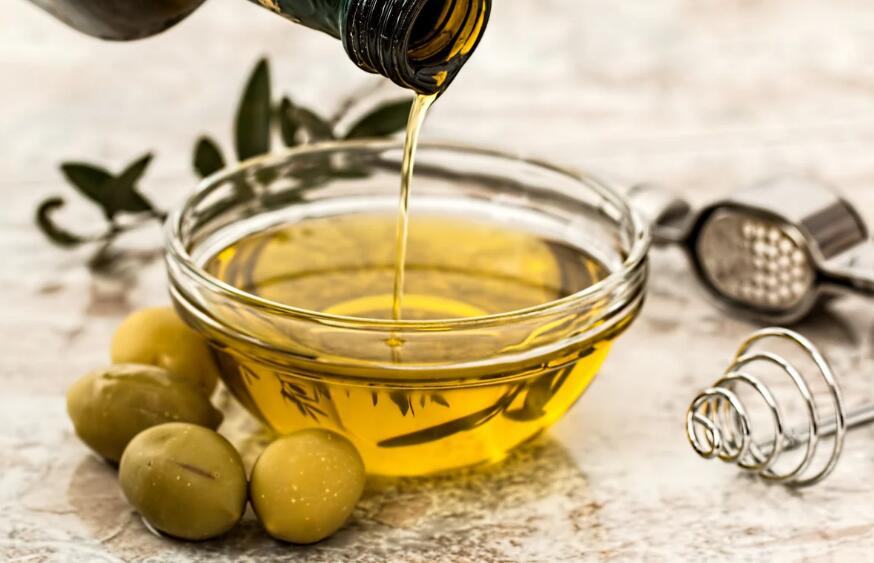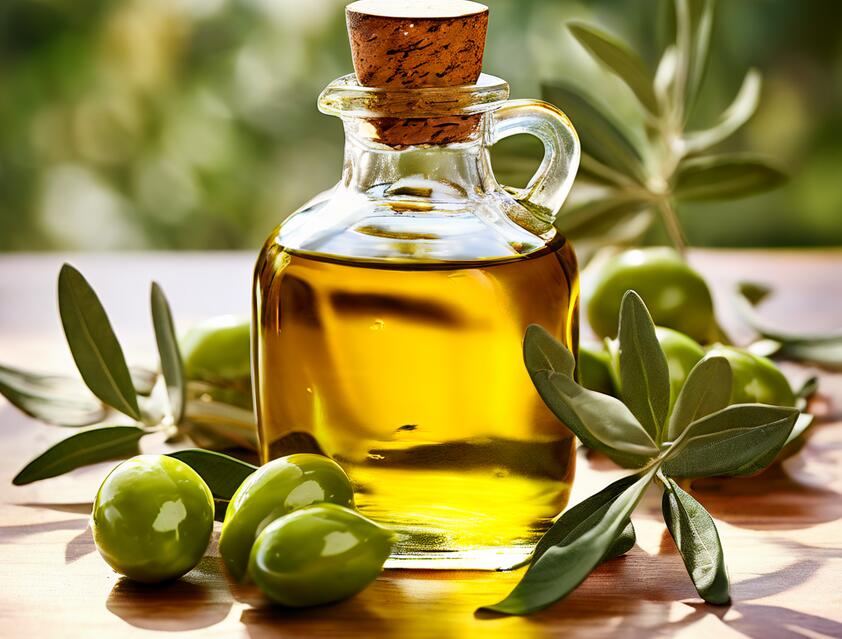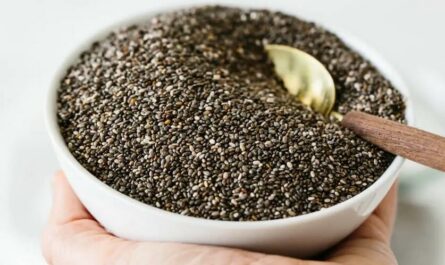Olive oil is a staple of the Mediterranean diet. It has been celebrated for its numerous health benefits for centuries. This golden elixir is rich in monounsaturated fatty acids (MUFAs), anti-inflammatory compounds, and antioxidants. This makes it a valuable addition to any healthy diet. However, to fully reap the benefits of olive oil, it’s crucial to understand the right daily dosage. In this article, we’ll discuss how much olive oil you should consume per day.
What is Olive Oil?
Olive oil is a fat obtained from the fruit of the olive tree (Olea europaea), which is native to the Mediterranean region. The oil is extracted by pressing whole olives.
There are several grades of olive oil, each with its own distinct characteristics:
- Extra Virgin Olive Oil (EVOO): This is the highest quality olive oil, made from pure, cold-pressed olives. It has a low acidity level (less than 0.8%) and is rich in antioxidants and bioactive compounds, giving it a distinct flavor and aroma.
- Virgin Olive Oil: This oil is also made from pure, cold-pressed olives but has a slightly higher acidity level (less than 2%). It has a good flavor and aroma, but may not be as intense as EVOO.
- Refined Olive Oil: This oil is made from lower-quality olives or oil that has been chemically treated to remove impurities. It has a neutral flavor and aroma and is often blended with virgin olive oils to create a more affordable product.
- Light or Extra Light Olive Oil: These oils are not lower in calories, but rather are lighter in color and flavor due to being highly refined. They have a higher smoke point. This makes them suitable for high-heat cooking, but they lack the beneficial compounds found in EVOO.

How Much Olive Oil Should You Consume Per Day?
How much olive oil should you aim to consume each day? The general consensus among experts is that 1-2 tablespoons (15-30 ml) of olive oil per day is a good amount for most people.
This recommendation aligns with the 2020-2025 Dietary Guidelines for Americans, which suggests consuming 27 grams (just under 2 tablespoons) of oils per day for a 2,000-calorie diet. Keep in mind that individual needs may vary based on age, sex, and activity level.
| Age Group | Recommended Daily Intake |
|---|---|
| Children 2-3 years | 1 teaspoon |
| Children 4-8 years | 1-2 teaspoons |
| Girls 9-13 years | 1 tablespoon |
| Boys 9-13 years | 1-2 tablespoons |
| Girls 14-18 years | 1-2 tablespoons |
| Boys 14-18 years | 2 tablespoons |
| Women 19+ years | 1-2 tablespoons |
| Men 19+ years | 2 tablespoons |
It’s important to note that while olive oil is healthy, it is still high in calories. One tablespoon contains around 120 calories. Therefore, it’s best to use olive oil in place of other less healthy fats, such as butter or refined vegetable oils.
The European Food Safety Authority (EFSA) also recommends a daily intake of about 20 grams (1.4 tablespoons) of extra virgin olive oil to protect against oxidation of blood lipids and to maintain normal blood LDL-cholesterol levels. This amount can be consumed as part of a balanced diet, replacing less healthy fats.
When incorporating olive oil into your diet, focus on replacing less healthy fats rather than simply adding more fat to your meals. For example, use olive oil instead of butter when sautéing vegetables, or as a dressing for salads instead of creamy, high-fat dressings.
It’s also crucial to choose high-quality, extra virgin olive oil to maximize the potential health benefits. Look for oils that are cold-pressed, unrefined, and have a dark glass bottle or tin to protect the oil from light and heat.
12 Health Benefits of Olive Oil
Olive oil is rich in monounsaturated fatty acids (MUFAs), which have been linked to numerous health benefits:
1. Supports Heart Health
One of the most well-known benefits of olive oil is its ability to support cardiovascular health. The high content of monounsaturated fatty acids (MUFAs) in olive oil helps reduce bad cholesterol (LDL) levels while increasing good cholesterol (HDL) levels. This balance is crucial in preventing the buildup of plaque in the arteries, lowering the risk of heart disease and stroke.
Moreover, the antioxidants found in olive oil, such as oleocanthal and oleuropein. It can reduce inflammation in the body, further protecting the heart and blood vessels.
2. Boosts Brain Function
The brain is largely composed of fatty acids, and the quality of these fats can significantly impact cognitive function. The monounsaturated fats in olive oil help maintain the integrity of brain cell membranes.
Additionally, studies have shown that olive oil has polyphenols, particularly oleocanthal. This can help reduce the risk of age-related cognitive decline and neurodegenerative diseases like Alzheimer’s.
These compounds can help reduce inflammation and oxidative stress in the brain. This can promote the growth of new brain cells, and improve memory and learning.
3. Fights Inflammation
Chronic inflammation is a root cause of many diseases, including arthritis, diabetes, and cancer. Olive oil contains powerful anti-inflammatory compounds, such as oleocanthal. It acts similarly to ibuprofen in reducing inflammation.
By incorporating olive oil into your diet, you can help combat chronic inflammation and reduce your risk of developing inflammatory diseases. This is particularly beneficial for those with conditions like rheumatoid arthritis or inflammatory bowel disease.
4. Promotes Weight Management
Contrary to popular belief, consuming healthy fats like those found in olive oil can aid in weight management. The monounsaturated fats in olive oil help promote feelings of fullness and satisfaction, reducing overall calorie intake.
Furthermore, studies have shown that following a Mediterranean diet rich in olive oil can lead to significant weight loss. This is likely due to the combination of healthy fats, fiber-rich vegetables, and lean proteins that characterize this eating pattern.
5. Enhances Skin Health
Olive oil isn’t just beneficial when consumed internally; it also works wonders for the skin when applied topically. The antioxidants in olive oil, such as vitamin E and polyphenols, help protect the skin from damage caused by free radicals and UV radiation.
These compounds also help to moisturize and nourish the skin, reducing the appearance of fine lines and wrinkles. Some studies have even suggested that applying olive oil to the skin may help prevent certain skin conditions, such as psoriasis and atopic dermatitis.
6. Supports Digestive Health
Olive oil can be a valuable addition to your diet for maintaining a healthy digestive system. The monounsaturated fats in olive oil help stimulate the production of bile and pancreatic enzymes. They are essential for proper digestion and nutrient absorption.
Moreover, the anti-inflammatory properties of olive oil can help reduce inflammation in the gut. This is often associated with conditions like inflammatory bowel disease and irritable bowel syndrome. Some studies suggested that consuming olive oil may help protect against the development of ulcerative colitis.
7. May Reduce Cancer Risk
While more research is needed, some studies have suggested that the compounds found in olive oil may have anti-cancer properties. The antioxidants in olive oil, particularly oleocanthal, can help inhibit the growth and spread of cancer cells.
Additionally, the monounsaturated fats in olive oil have been associated with a reduced risk of certain types of cancer, including breast, colon, and prostate cancer. This is due to the ability of these healthy fats to reduce inflammation and oxidative stress in the body.
8. Supports Bone Health
Olive oil may also play a role in maintaining strong, healthy bones. Studies have shown that the polyphenols in olive oil can help increase bone formation and mineralization while reducing bone loss.
This is particularly important for older adults, who are at a higher risk of developing osteoporosis and fractures. Incorporating olive oil into your diet can help support optimal bone health throughout life.

9. Boosts Immune Function
The immune system is our body’s first line of defense against infections and diseases. Olive oil contains several compounds that can help support immune function, including antioxidants and anti-inflammatory agents.
These compounds work by neutralizing harmful free radicals and reducing inflammation in the body. This can help enhance the immune system’s ability to fight off pathogens.
Some studies show that consuming olive oil may help reduce the severity and duration of certain infections, such as the common cold.
10. Promotes Longevity
The Mediterranean diet, which is rich in olive oil, has been associated with increased longevity and a reduced risk of chronic diseases. This is likely due to the combination of healthy fats, antioxidants, and anti-inflammatory compounds found in olive oil and other staples of the Mediterranean diet.
By incorporating olive oil into your daily diet, along with other healthy lifestyle habits, you may be able to increase your lifespan and improve your overall quality of life.
11. Enhances Nutrient Absorption
Olive oil can also help enhance the absorption of certain nutrients from other foods. Many vitamins and minerals, such as vitamins A, D, E, and K, are fat-soluble. This means they require the presence of fat to be properly absorbed by the body.
By using olive oil as a dressing for salads or as a cooking oil for vegetables, you can help increase the bioavailability of these essential nutrients. This can lead to better overall nutrition and improved health outcomes.
12. Versatile and Delicious
Finally, one of the greatest benefits of olive oil is its versatility and delicious taste. Olive oil can be used in a wide variety of culinary applications, from sautéing and roasting to baking and dressing salads.
The rich, fruity flavor of extra virgin olive oil can elevate any dish. By experimenting with different types of olive oil and using it in creative ways, you can enjoy all the health benefits of this liquid gold while satisfying your taste buds.
How to Incorporate Olive Oil into Your Daily Diet?
If you want to consume more olive oil, one of the simplest ways is to drink it directly. While this might not sound appealing, it is completely safe and one of the easiest ways to increase your healthy fat intake.
Drinking olive oil may also be the healthiest approach. As you’re not heating the oil, which keeps all the plant-based compounds and antioxidants intact.
You can drink olive oil as a shot or straight off a teaspoon. If you find regular olive oil too difficult, you could try flavored or infused olive oil instead. These products are often still high-quality but have extra flavor that can make them easier to drink.
How to Choose the Right Olive Oil? Which Type Of Olive Oil Is Best?
Not all olive oils are created equal. To maximize the health benefits, opt for extra virgin olive oil (EVOO) whenever possible. EVOO is the least processed and retains the highest levels of beneficial polyphenols and antioxidants compared to more refined varieties.
Virgin olive oil is a good second choice, as it is only slightly more processed than EVOO and still contains most of the beneficial compounds, albeit in lower concentrations.
Light, pure, and refined olive oils undergo more extensive processing, resulting in a milder flavor and significantly fewer health-promoting compounds. While these oils are still a better choice than many other cooking oils, they don’t offer the same level of benefits as EVOO or virgin olive oil.
When purchasing olive oil, look for the following:
- Quality Seals: Seals from organizations like the North American Olive Oil Association (NAOOA), the International Olive Council (IOC), or the California Olive Oil Council (COOC) indicate that the oil has been tested for quality and purity.
- Dark Bottles: Olive oil should be stored in dark glass bottles or tins to protect it from light, which can cause the oil to deteriorate.
- Harvest Date: Look for oils with a harvest date on the label. The fresher the oil, the better the flavor and nutritional value.
- Origin: Opt for oils from a single country or region, as this often indicates higher quality and stricter production standards.
Potential Risks and Precautions
While olive oil is generally considered safe and beneficial for most people, there are a few potential risks and precautions to keep in mind:
- Calorie Density: As mentioned earlier, olive oil is calorie-dense, providing 120 calories per tablespoon. Consuming too much olive oil can lead to excess calorie intake.
- Medication Interactions: In some cases, olive oil may interact with certain medications, such as blood thinners or diabetes medications. If you are taking any medications, it’s essential to consult with your healthcare provider.
- Allergies: While rare, some individuals may have an allergy or sensitivity to olive oil. Symptoms can include itching, hives, or difficulty breathing. If you experience any adverse reactions after consuming olive oil, discontinue use and consult with a healthcare professional.






